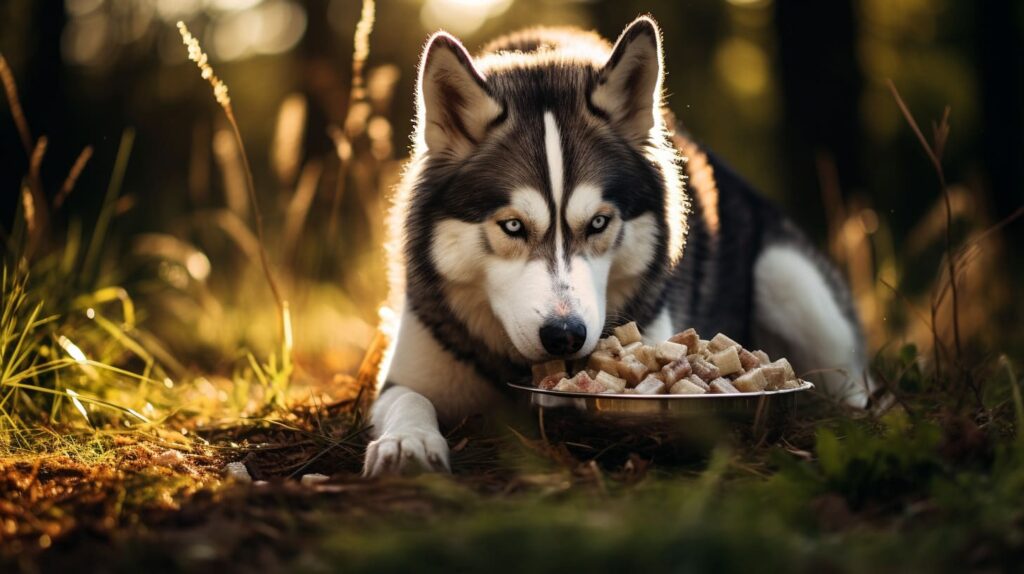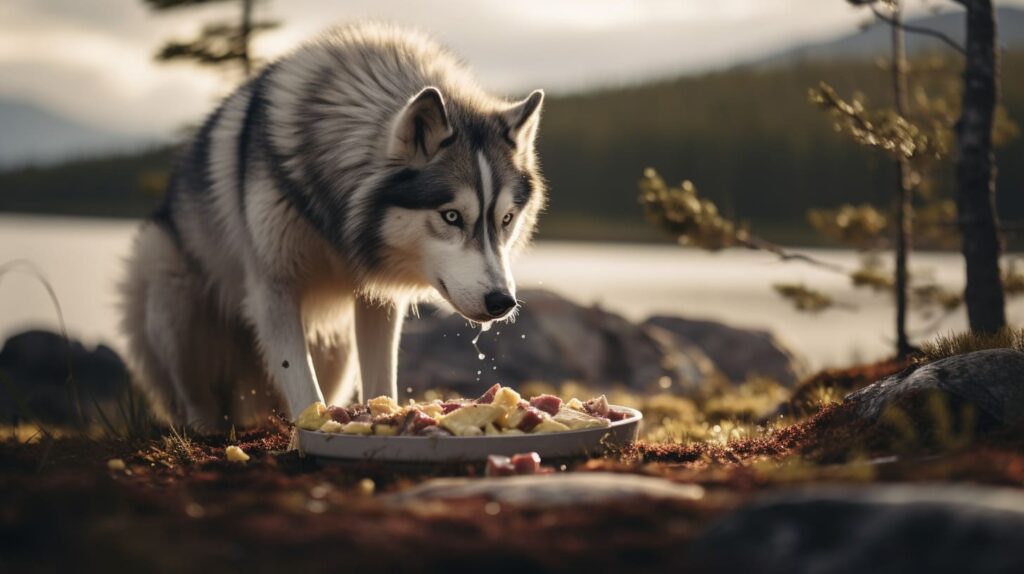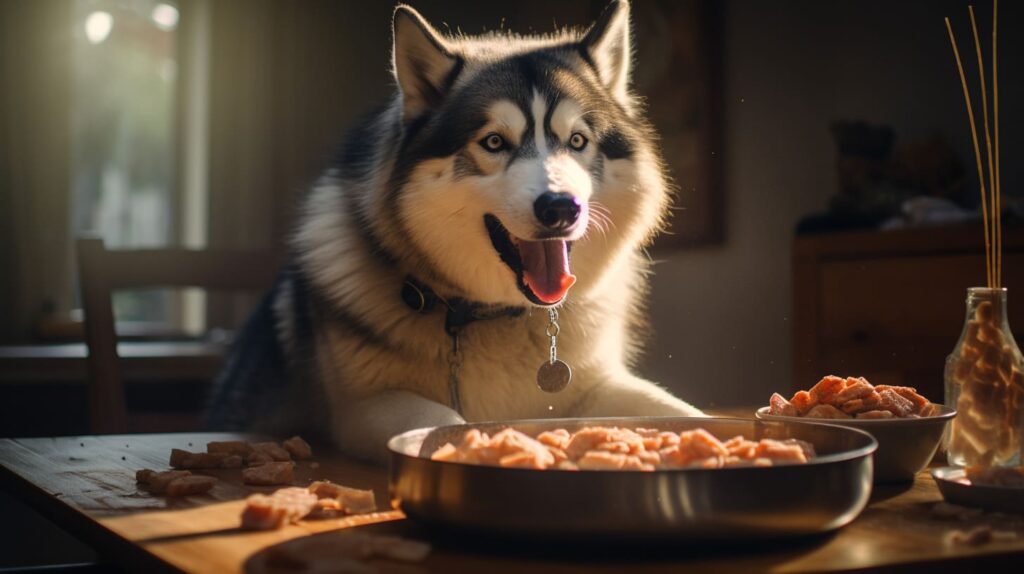Feeding a Husky is not just a task, it’s an expedition into the world of nutrition to ensure that their high-octane energy is well-fueled. A balanced diet is like a golden ticket for your Husky’s overall well-being, keeping them happy, healthy, and ready to dash through life with their signature zeal. The dietary needs of Huskies are as unique as their stunning blue eyes, owing to their high energy levels and a metabolism that runs faster than they do on a sled trail. This guide is your map to navigating the nutritional landscape, ensuring that every mealtime is a jackpot of balanced nourishment for your furry companion.
Understanding Your Husky’s Nutritional Needs
Every Husky is a bundle of joy and energy, wrapped in fur. The fuel for this joyous energy comes from a diet that’s packed with the right nutrients. Let’s take a sleigh ride through the essential nutritional elements that should grace your Husky’s bowl.
- Proteins: The building blocks of muscles, proteins are like the sled team that pulls your Husky’s health on the right track. They promote muscle development and tissue repair, ensuring your Husky is always ready to dash through the snow or your backyard.
- Fats: Fats are the energy reserves that power your Husky’s playful sprints. They also keep their stunning coat shiny and support brain development, especially in puppies.
- Carbohydrates: Though not a high requirement, carbohydrates provide that extra bit of energy and are essential for digestive health. They are like the extra puff of snow that makes sledding smooth.
- Vitamins and Minerals: These are the checkpoints on the trail, ensuring your Husky’s internal systems function smoothly. They support various bodily functions like bone health, blood clotting, and immune response.
- Calories: The caloric needs of a Husky can be likened to the fuel needed to keep the sled going. Enough calories ensure that your Husky has the energy to stay active and healthy, but not so much that they become overweight.
The Husky dietary trail is a balanced blend of these nutrients, ensuring every mealtime is a celebration of good health and boundless energy.

The Right Balance: Core Components of a Husky Diet
Embarking on the trail of a balanced diet begins with understanding the core components that should be included in your Husky’s meal plan. Let’s unveil the husky dietary trinity: protein, fats, and carbohydrates.
Protein: The Mainstay
Protein is like the lead dog of your Husky’s dietary sled team, guiding the way toward muscle strength and overall growth. It’s vital in repairing body tissues and creating enzymes, hormones, and other bodily chemicals. Animal-based proteins such as chicken, beef, and fish are excellent choices since they provide the full spectrum of essential amino acids your Husky needs. An adult Husky requires about 18% of their diet to be protein, while Husky puppies require about 22%.
Fats: Essential yet Tricky
Fats are your Husky’s energy powerhouse, offering twice the power that proteins and carbohydrates do. They are essential for absorbing vitamins and promoting healthy skin and a glossy coat, like your Husky’s natural snowsuit. While fats are crucial, they should be given in moderation to prevent obesity. Omega-3 and Omega-6 fatty acids are particularly beneficial. Sources include fish oil, flaxseed, and high-quality commercial dog foods.
Carbohydrates: Necessary in Moderation
Carbohydrates are like the extra mushers who provide additional energy on the trail. They should be given in moderation as Huskies utilize proteins and fats for energy more efficiently. However, they are still beneficial for digestive health, providing dietary fiber to keep things moving smoothly through the digestive tract. Whole grains, vegetables, and fruits are good sources of complex carbohydrates and fiber.
Each of these core components plays a unique role in maintaining your Husky’s health and energy levels. Balancing them in the right proportions is crucial to ensure your Husky’s diet is as magnificent and energetic as the Northern Lights!
Vitamins and Minerals: The Unsung Heroes
Vitamins and minerals might not be the stars of the show in your Husky’s diet, but they surely are the backstage crew that ensures every performance is flawless. They play a crucial role in bone development, blood coagulation, muscle contraction, and immune system support among a plethora of other functions. Let’s dive into the snowy realm of vitamins and minerals to uncover their importance in your Husky’s diet.
Vitamins like A, B, C, D, E, and K each have unique roles. For instance, Vitamin A is essential for vision, immune function, and skin health, while Vitamin D is crucial for bone health and metabolism. Vitamins can be found in various foods, including meats, grains, vegetables, and fruits.
Minerals like calcium, phosphorus, potassium, and magnesium are also fundamental to your Husky’s health. Calcium and phosphorus are essential for bone and teeth formation, potassium is vital for nerve impulse transmission, muscle contraction, and maintenance of fluid balance, while magnesium is necessary for muscle and nerve function and bone health.
Though essential, vitamins and minerals should be provided in the right amounts as too much or too little can lead to health problems. For instance, an excess of calcium can lead to bone problems, especially in puppies.
Your Husky’s diet should be a smorgasbord of essential vitamins and minerals to ensure they can leap, sprint, and play to their heart’s content. While high-quality commercial dog foods usually contain the necessary vitamins and minerals, consulting with your veterinarian to determine if your Husky needs any additional supplementation is a wise move.
The symphony of vitamins and minerals in your Husky’s diet orchestrates a harmonious tune of health, energy, and vitality, ensuring they are always ready to dash through life with their signature gusto!
Hydration: The Fluid Balance
Keeping your Husky well-hydrated is like ensuring the snow under their paws is just the right level of powdery—essential for a smooth run. Water plays a pivotal role in almost every function in your Husky’s body, from digestion and nutrient absorption to temperature regulation and joint lubrication.
Huskies, with their thick coats, are well-adapted to cold climates. However, they can get dehydrated, especially in warmer temperatures. Ensuring they have fresh water available at all times is crucial. Here are some tips to keep the hydration game strong:
- Always Accessible: Make sure your Husky has access to fresh water at all times. Keeping multiple water bowls around the house and yard can be a helpful reminder for them to take a sip.
- Encourage Drinking: Sometimes, Huskies might need a little nudge to drink water. You can encourage them by adding a splash of chicken broth to their water or using a drinking fountain which many dogs find intriguing.
- Water-rich Foods: Incorporating wet dog food or water-rich vegetables and fruits like cucumbers and watermelon in their diet can also help keep them hydrated.
- On-the-Go Hydration: If you’re out and about with your Husky, carry a portable dog water bottle to keep them hydrated on the go.
- Avoid Exercise During the Hottest Parts of the Day: Schedule your play and exercise sessions during cooler parts of the day to prevent overheating and dehydration.
- Monitor Urination: Keep an eye on your Husky’s urination habits. Frequent urination in small amounts can be a sign of dehydration.
Hydration is like the silent sled driver, ensuring a smooth ride through the snowy trails of health. So, the next time your Husky takes a long, satisfying drink after a playful romp, know that you’re on the right track in keeping them hydrated, healthy, and happy!
Commercial Dog Food vs. Homemade Meals: Weighing the Scales
When it comes to feeding your husky, the fork in the trail presents itself as a choice between commercial dog food and homemade meals. Both pathways have their own sets of pros and cons, and understanding them can help you make an informed decision.
Commercial Dog Food: The Packaged Trail
Commercial dog foods come with the convenience of pre-measured, nutritionally balanced meals. They often adhere to the nutritional standards set by the Association of American Feed Control Officials (AAFCO), ensuring that your Husky receives the essential nutrients. High-quality commercial dog food brands often have the right balance of protein, fats, carbohydrates, vitamins, and minerals that a Husky requires. They also come in various formulations catering to different life stages, sizes, and health conditions. However, not all commercial dog foods are created equal. It’s vital to choose a premium quality brand with high protein content and no artificial additives.
Homemade Meals: The Customized Trail
Homemade meals allow for a personalized approach to your Husky’s diet. You have control over the ingredients, ensuring fresh, wholesome meals sans any artificial preservatives or fillers. It also allows for a variety of foods, which can be more exciting for your Husky. However, the trail of homemade meals can be slippery without proper knowledge. Balancing the nutrients in the right proportion requires a sound understanding of canine nutrition. Moreover, preparing daily meals can be time-consuming.
The Middle Trail: Mix and Match
A balanced approach could be a mix of both commercial and homemade meals. This way, your Husky gets the best of both worlds—a balanced diet and a variety of foods.
Whatever path you choose, consulting with a veterinarian or a pet nutritionist is key to ensure that the dietary needs of your Husky are being met adequately. The goal is to ensure a balanced diet that keeps your Husky’s tail wagging, eyes sparkling, and paws ready to dash through life with boundless energy!

Monitoring Your Husky’s Diet: Paws on the Scale
Once you have set a meal plan for your Husky, it’s essential to keep a vigilant eye on how it’s affecting their health and energy levels. Monitoring your Husky’s diet is like being an attentive musher on a sled ride, always aware of how the dogs are performing, and ready to make adjustments as needed. Here’s how to keep a paw on the scale and ensure your Husky’s diet remains balanced and beneficial:
Regular Vet Checkups
Regular veterinary checkups are essential to monitor your Husky’s health. Your vet can provide valuable insights into whether your Husky’s current diet is meeting their nutritional needs or if adjustments are needed.
Monitor Weight and Body Condition
Keep a close eye on your Husky’s weight and body condition. A sudden weight gain or loss could be a signal that a dietary adjustment is necessary. The ideal body condition should have a visible waistline and the ribs should be felt easily but not seen.
Keep an Eye on Energy Levels
A balanced diet should provide your Husky with ample energy for their daily activities. If you notice a decline in their energy levels, it might be time to reassess their diet.
Check the Coat and Skin
Your Husky’s coat should be lush and shiny, and the skin should be free from flakes or redness. A dull coat or irritated skin could be signs of nutritional deficiencies.
Monitor Stool Consistency
Regular, firm stools are a good indicator of a well-balanced diet. If you notice any changes in the consistency or frequency of your Husky’s stools, it might be time to consult with your vet.
Record and Adjust
Maintain a feeding diary to record what and how much you feed your Husky, along with any treats or supplements. Note any changes in weight, energy, and overall health. This record can be a valuable tool in adjusting the diet as needed.
Keeping a watchful eye on how your Husky is responding to their diet, and being ready to make adjustments as needed, will ensure your furry companion stays healthy, happy, and ready to race joyously through the snow-covered trails of life!
Fluffy Final Facts
Embarking on the journey of creating a balanced diet for your Husky is like setting out on a thrilling sled ride through the nutritional tundra. The path may have its share of twists and turns, but with the right knowledge and guidance, it leads to a destination of health and happiness for your furry companion. A well-balanced diet is the fuel that propels your Husky through the exhilarating trails of life, ensuring they remain energetic, healthy, and as vibrant as the Northern Lights.
A balanced diet for your Husky encompasses a perfect blend of proteins, fats, carbohydrates, vitamins, minerals, and water. Each element plays a unique role, like a musician in an orchestra, contributing to the overall symphony of your Husky’s health. The choice between commercial dog food and homemade meals is like choosing between different trails — each with its own set of adventures and challenges. However, a mix of both could often lead to the most scenic and rewarding route, ensuring a variety of nutrients and flavors for your Husky.
Monitoring your Husky’s diet is crucial to ensure they are on the right track towards a healthy life. Regular vet checkups, monitoring weight, and keeping an eye on their energy levels are all part of being an attentive and loving musher to your sled dog.
As you glide through the snow-clad journey of ensuring a balanced diet for your Husky, remember, the ultimate goal is to see them flourish, with their tails wagging, eyes sparkling, and paws prancing with joy and vitality. So, harness up, mush on, and let the nutritional expedition lead the way to a healthy, happy Husky!






